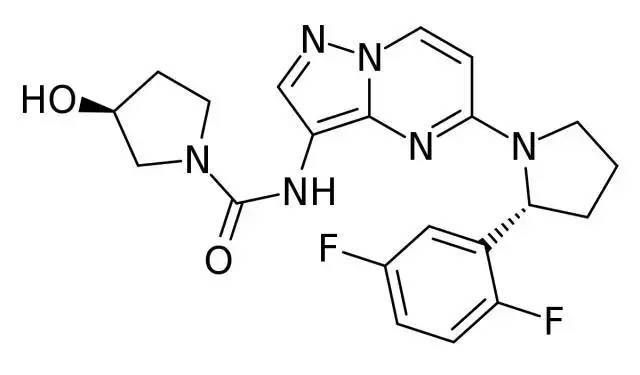Bayer “broad-spectrum” anticancer drug Vitrakvi has been approved by Japan
- Why Lecanemab’s Adoption Faces an Uphill Battle in US?
- Yogurt and High LDL Cholesterol: Can You Still Enjoy It?
- WHO Releases Global Influenza Vaccine Market Study in 2024
- HIV Infections Linked to Unlicensed Spa’s Vampire Facial Treatments
- A Single US$2.15-Million Injection to Block 90% of Cancer Cell Formation
- WIV: Prevention of New Disease X and Investigation of the Origin of COVID-19
Bayer “broad-spectrum” anticancer drug Vitrakvi has been approved by Japan
Bayer “broad-spectrum” anticancer drug Vitrakvi has been approved by Japan. Bayer’s “broad-spectrum” targeted anticancer drug Vitrakvi has been approved by Japan: it has a strong effect on the treatment of various TRK fusion cancers!

Bayer recently announced that Japan’s Ministry of Health, Labour and Welfare (MHLW) has approved its precision oncology drug Vitrakvi (larotrectinib), which is an oral TRK inhibitor designed to treat the presence of neurotrophic tyrosine in tumors. Children and adults with advanced or metastatic solid tumors with NTRK gene fusion. At present, Vitrakvi has been approved in many countries and regions around the world, including the United States, the European Union, and the United Kingdom. Applications in other regions are ongoing or planned.
Vitrakvi has a high remission rate, lasting remission and good safety in adult and child TRK fusion cancers. In patients with primary central nervous system (CNS) tumors and CNS metastases, treatment remission and high disease control rates have also been observed.
The approval of Vitrakvi on the market will provide Japanese patients and doctors with a highly selective therapy specifically designed for adult and child TRK fusion cancer. Regardless of tumor type or patient age, it has the potential to significantly improve treatment results. Previously, anticancer drugs were mainly used for cancer in a certain part of the body, and Vitrakvi was developed specifically to treat patients with TRK fusion cancer, no matter where the tumor originated in the body. Vitrakvi is an important advance in the fight against this rare cancer because it will replace expensive treatments that are not specifically targeted at this type of cancer and have not proven effectiveness and safety in this type of patient population.
Scott Z. Fields, MD, Senior Vice President and Head of Oncology Development, Bayer Pharmaceuticals, said: “Therapeutic drugs that directly target genomic abnormalities that drive tumor growth, such as Vitrakvi, can provide value to patients and doctors in Japan, regardless of tumor type or patient. Regardless of age, there is the potential to significantly improve treatment outcomes. This approval further emphasizes the importance of high-quality and accessible genomic testing to more accurately identify patients who are most likely to benefit from NTRK gene fusion treatment of tumors. It supports Clinicians give the right patients the right, effective and safe treatment at the right time.”
In Japan, Vitrakvi’s approved adult patient phase I trial, adult and adolescent patient phase II NAVIGATE trial, and pediatric patient phase I/II SCOUT trial have aggregated data from 125 patients. In these trials, Vitrakvi was investigated and treated more than 20 solid tumors with different histologies, including lung cancer, thyroid cancer, melanoma, gastrointestinal stromal tumor, colon cancer, cholangiocarcinoma, soft tissue sarcoma, salivary gland cancer and infants Fibrosarcoma and so on.
The results showed that Vitrakvi treatment showed a high remission rate, rapid and long-lasting remission. The specific data are: (1) The analysis data from the NAVIGATE trial patient population showed that the overall response rate (ORR) was 65.2%, of which the complete response rate (CR) was 16.9%; (2) The data from the SCOUT trial showed that the ORR was 88.9%, CR is 22.2%. Safety data from 116 patients in the NAVIGATE trial and 73 patients in the SCOUT trial showed that Vitrakvi showed good safety.
Viktarvy’s treatment of TRK fusion-driven cancer in adults and children has clinically significant improvements in patient quality of life (QoL). In two global multicenter clinical trials, 60% of adult patients reported an improvement in the EORTC QLQ-C30 global health score. For pediatric patients, 76% of patients reported an improvement in the total PedsQL score.

Larotrectinib molecular structure
TRK fusion cancers are generally rare, can affect children and adults, and occur at different frequencies in different tumor types. When an NTRK gene is fused with another unrelated gene to produce an altered TRK protein, TRK fusion cancer will occur. The altered protein, or TRK fusion protein, becomes constitutively active or overexpressed, triggering the activation of the intercellular signaling cascade. These TRK fusion proteins act as the driving factors of oncogenes and can promote the spread and growth of tumors no matter where the tumor originates.
Vitrakvi is a pioneering oral TRK inhibitor. Its active pharmaceutical ingredient larotrectinib is a potent, oral, and selective tropomyosin receptor kinase (TRKs) inhibitor designed to directly target TRK (including TRKB, TRKB) , And TRKC), close the signaling pathway that leads to TRK fusion tumor growth. TRK fusion-driven tumors can occur in various parts of the body, and conventional treatment options (such as surgery, chemotherapy, radiotherapy, etc.) usually cannot achieve satisfactory treatment results.
Vitrakvi is a histology-independent treatment method specifically developed to treat tumors carrying NTRK gene fusions, regardless of where the tumor originated in the body. In children and adult patients with TRK fusion tumors, Vitrakvi has strong curative effects, including for primary central nervous system (CNS) tumors and brain metastases, providing high remission rates and long-lasting remissions, regardless of the patient’s age and tumor histology .
At the end of November 2018, Vitrakvi won the world’s first batch in the United States, becoming the first oral TRK inhibitor approved in history, and also the first “unrestricted cancer type, broad-spectrum” targeted anticancer drug that has nothing to do with tumor type. . Currently, Vitrakvi has been approved in many countries and regions around the world, including the European Union. (
(source:internet, reference only)
Disclaimer of medicaltrend.org



